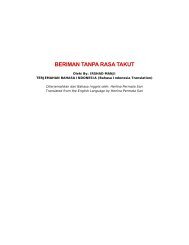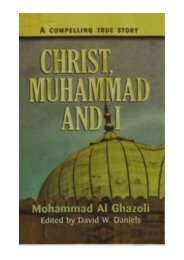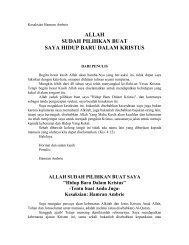A Critical Analysis of 'Real Islam'. Its People ... - Bukti dan Saksi
A Critical Analysis of 'Real Islam'. Its People ... - Bukti dan Saksi
A Critical Analysis of 'Real Islam'. Its People ... - Bukti dan Saksi
Create successful ePaper yourself
Turn your PDF publications into a flip-book with our unique Google optimized e-Paper software.
eally matters is how millions <strong>of</strong> self-described devout Muslims understand it today and how they intend<br />
to act on their belief. What it has meant in the past (up to and including today) has already been fully<br />
defined by all previous actions <strong>of</strong> Muslim Militants in their conduct toward non-believers, and further<br />
debate to clarify or change that historical reality is just plain silly. Any honest review <strong>of</strong> Islamic history<br />
from 610 to 2004 answers the question <strong>of</strong> Jihadic definition quite convincingly, a portion <strong>of</strong> which will be<br />
reviewed in subsequent chapters. As far as majority Muslim understanding and use <strong>of</strong> the Jihad term goes,<br />
nothing much has changed through the last 1400 years. The lesser Jihad cannot be separated out from the<br />
greater Jihad and ignored; it appears they are both a part <strong>of</strong> unalterable core Islam. Anyone who suggests<br />
otherwise is either being deceitful …or has been deceived. The basic Islamic worldview sees all lands as<br />
either as Dar al-Islam (the abode <strong>of</strong> Islam), or Dar al-Harb (the abode <strong>of</strong> war). All those countries and<br />
societies not currently dominated by Islamic supremacy are by default the abode <strong>of</strong> war, where Jihad (and<br />
deception) is always fully justified. Those who contend that jihad war is not a main tenet <strong>of</strong> traditional<br />
Islam do so either deceitfully or in blissful ignorance.<br />
The writings <strong>of</strong> two contemporary Muslim scholars <strong>of</strong> jihad, the late Majid Khadduri, and Bassam<br />
Tibi, confirm that Islam in our age is still in uniform compliance with the earlier sacred writings. The<br />
uniquely Islamic conception <strong>of</strong> "House <strong>of</strong> War" (Dar ul-Harb) and "House <strong>of</strong> Islam" (Dar ul-Islam) was a<br />
consensus formulation from the early classical period <strong>of</strong> Muslim jurisprudence.<br />
Majid Khadduri’s 1955 treatise on jihad remains one <strong>of</strong> the most respected analyses <strong>of</strong> this institution,<br />
summarizing the consensus views <strong>of</strong> these previous Islamic experts as follows:<br />
Thus the jihad may be regarded as Islam’s instrument for carrying out its ultimate objective by turning all<br />
people into believers, if not in the prophethood <strong>of</strong> Muhammad (as in the case <strong>of</strong> the dhimmis), at least in the<br />
belief <strong>of</strong> God. The Prophet Muhammad is reported to have declared "some <strong>of</strong> my people will continue to fight<br />
victoriously for the sake <strong>of</strong> the truth until the last one <strong>of</strong> them will combat the anti-Christ." Until that moment is<br />
reached the jihad, in one form or another will remain as a permanent obligation upon the entire Muslim<br />
community. It follows that the existence <strong>of</strong> a dar al-harb is ultimately outlawed under the Islamic jural order;<br />
that the dar al-Islam (Islamic community) are permanently under jihad obligation until the dar al-harb is reduced<br />
to non-existence; and that any community accepting certain disabilities- must submit to Islamic rule and reside<br />
in the dar al-Islam or be bound as clients to the Muslim community. The universality <strong>of</strong> Islam, in its all<br />
embracing creed, is imposed on the believers as a continuous process <strong>of</strong> warfare, psychological and political if<br />
not strictly military. [19]<br />
And in 1996, Bassam Tibi wrote this:<br />
At its core, Islam is a religious mission to all humanity. Muslims are religiously obliged to disseminate the<br />
Islamic faith throughout the world. "We have sent you forth to all mankind" (Q. 34:28). If non-Muslims submit<br />
to conversion or subjugation, this call (da’wa) can be pursued peacefully. If they do not, Muslims are obliged to<br />
wage war against them. In Islam, peace requires that non-Muslims submit to the call <strong>of</strong> Islam, either by<br />
converting or by accepting the status <strong>of</strong> a religious minority (dhimmi) and paying the imposed poll tax, jizya.<br />
World peace, the final stage <strong>of</strong> the da’wa, is reached only with the conversion or submission <strong>of</strong> all mankind to<br />
Islam…Muslims believe that expansion through war is not aggression but a fulfillment <strong>of</strong> the Qur’anic<br />
command to spread Islam as a way to peace. The resort to force to disseminate Islam is not war (harb), a word<br />
that is used only to describe the use <strong>of</strong> force by non-Muslims. Islamic wars are not hurub (the plural <strong>of</strong> harb) but<br />
rather futuhat, acts <strong>of</strong> "opening" the world to Islam and expressing Islamic jihad. Relations between dar al-<br />
Islam, the home <strong>of</strong> peace, and dar al-harb, the world <strong>of</strong> unbelievers, nevertheless take place in a state <strong>of</strong> war,<br />
according to the Qur’an and to the authoritative commentaries <strong>of</strong> Islamic jurists. Unbelievers who stand in the<br />
way, creating obstacles for the da’wa, are blamed for this state <strong>of</strong> war, for the da’wa can be pursued peacefully<br />
if others submit to it. In other words, those who resist Islam cause wars and are responsible for them. Only<br />
when Muslim power is weak is ‘temporary truce’ (hudna) allowed (Islamic jurists differ on the definition <strong>of</strong><br />
‘temporary’). [20]<br />
Finally, as author Ram Swarup observed in Understanding Islam through Hadis: "Jihad is a divinely<br />
ordained institution in Islam. By many authorities it is counted as one <strong>of</strong> the pillars <strong>of</strong> Islam.<br />
Theologically, it is an intolerant idea: a tribal god, Allah, trying to be universal through conquest.<br />
Historically, it was an imperialist urge masked in religious phraseology."<br />
Recent Muslim Views on Islam and Jihad





